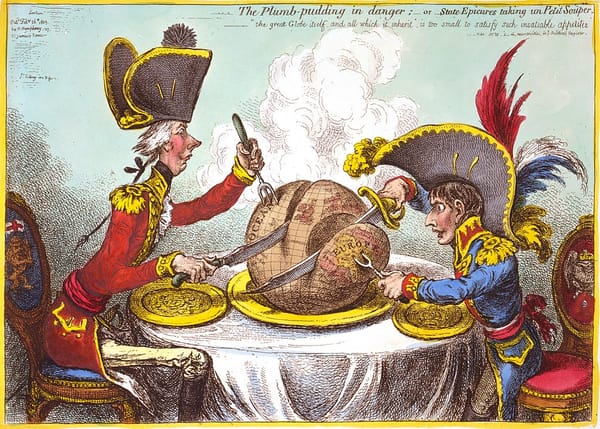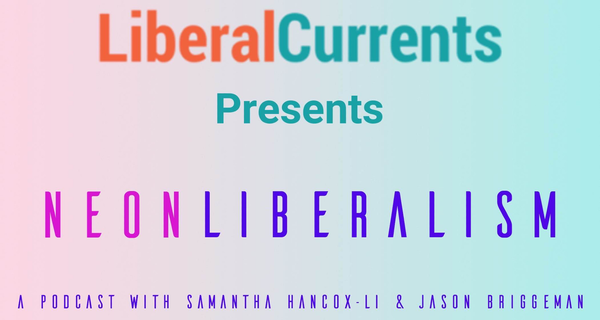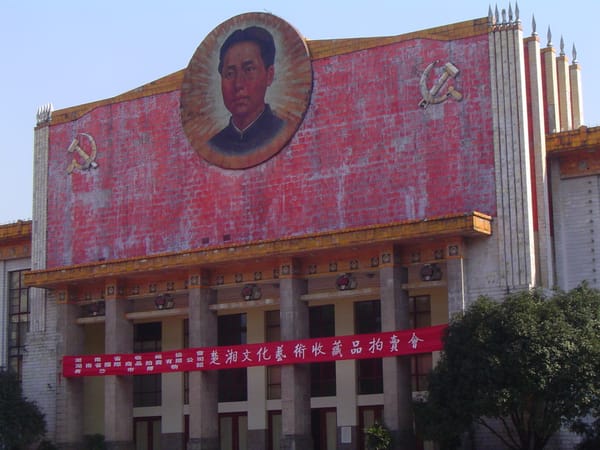The Illiberalism of Regime Change as Foreign Policy

If ever rival countries were to be united by a truly common enemy, infectious disease should be that threat. The COVID-19 pandemic has had a devastating impact on the global economy and has killed tens of thousands of people worldwide; containing and treating it is truly a global priority. However, even in this context, efforts at international cooperation have been stymied by mistrust. For example, the United States has offered millions in medical aid to the Islamic Republic of Iran; Iran, however, has rejected this offer, insisting instead that the United States lift sanctions against it.
Why would the Iranian leadership reject aid when the country is clearly in crisis? Simply put, they must assume that every decision the United States makes has a clear goal and is part of a grand strategy. And the United States has made clear that its ultimate goal for Iran is the overthrow of the Islamic Republic. Therefore, Iranian leadership must assume that even this apparently humanitarian gesture is in fact part of a larger strategy of weakening and destroying their regime. While it is easy to blame the Iranian authorities for placing their political interests above the well-being of their people, this is a predictable response, and this deep and counter-productive mistrust is an inevitable result of the United States’ consistent foreign policy strategy of prioritizing regime change above all other goals.
Regime change in American history
Since the Cold War, the United States has frequently designated ‘regime change’ as the ultimate goal of resolving foreign policy challenges. While replacing foreign governments with those assumed to be friendlier to US interests is an old tool in US foreign policy, the modern practice picked up considerable steam under president Eisenhower. The overthrow of both Jacobo Arbenz in Guatemala and Mohammed Mossadegh in Iran marked a substantial turning point in US foreign policy, from a containment strategy towards one of ‘rolling back’ Communism wherever possible. The bi-polar nature of the Cold War world contributed to these decisions—it was uncommon for foreign leaders to defect from their side in the Cold War, and coaxing them to do so was often expensive. The relative ease with which Arbenz and Mossadegh were toppled, and the apparent loyalty of their successors to defending US geopolitical and business interests, encouraged further efforts. In the short term, toppling a less desirable regime seemed to be both easier and more certain than attempting to win them over with development money or other expensive favors.
Since the 1950s, regime change has been pursued by presidents of both parties. It remains popular despite its now obvious long-term shortcomings, in part because it is dramatic and allows presidents to project an image of uncompromising strength. Far easier to sell the public on standing firm against evil than on the finer points of a more nuanced diplomacy. But this stance makes negotiation and reconciliation difficult. Finally, regime change, due to the current state of war powers and intelligence oversight in the US, can often be pursued by the executive largely on its own, and can be completed within a single presidential term. By contrast, a hostile Senate can throw up many difficulties to negotiated solutions, and, as Obama’s Iran deal demonstrates, true rapprochement requires many years and can be easily reversed by a president’s successor.
While it is easy to see why presidents from a variety of political perspectives find regime change to be a tempting strategy to pursue, making regime change the goal of US foreign policy has decreased the ability of the United States to pursue goals by other, more liberal means. This is because regime change is fundamentally at odds with a liberal view of international relations, which views rule-based regimes and the use of negotiation and positive-sum arrangements as the key to overcoming the instability of an anarchic global system. By taking the tools of liberal foreign policy off the table, the United States has also limited its abilities to meet its substantive foreign policy goals beyond mere regime change.
Liberal international relations
Liberal theory of international relations emerged largely as an alternative to ‘realist’ theory. Realists insisted that states exist in an essentially anarchic structure. Because every state was in constant danger, all were constrained to continue accumulating the power necessary to defend themselves from potential enemies, regardless of ideological preferences or norms of behavior. Since power is the main currency in a realist model, realist thinking tends to be zero-sum—the power one state gains reduces the relative power of others, as each state increases its own security at the expense of its neighbors.
Liberalism, on the other hand, argues that many areas of international interaction are not zero-sum. This is partially due to liberalism’s acknowledgement of non-state actors, like consumers, corporations, and other communities. Two states can interact in terms of trade, criminal justice, the environment, and other areas in ways that benefit their citizens and thus benefit both states, so that the gain of one is not necessarily the loss of another. Indeed, by negotiating solutions to terrorism, arms control, and the like, states may increase their own security, even, without threatening their neighbors. These interactions, however, require the proper context to occur. Most liberal theorists have agreed that international organizations, what Bruce Russett and John O’Neal call a “thick web of international institutions” and strong rules and norms of behavior they promote, make cooperation more effective and reduce the chance of violent confrontation.
A useful illustration of how this works is the famous ‘prisoner’s dilemma’ game, in which two players independently choose to cooperate with one another or betray one another. The best outcome is cooperation, but the worst for a single player is to attempt to cooperate when their partner chooses betrayal. Two players randomly playing the game will rarely cooperate with one another, because in a single game trusting one’s partner will lead, more often to not, to betrayal and an enormous loss.
However, when playing with the same partner over multiple rounds, with the possibility of discussing terms and negotiating, the two players should be able to reach the cooperation equilibrium and improve their overall outcomes. This is the idea behind many international bodies founded after the second world war—by providing a forum for negotiation and discussion, the United Nations and its many constituent bodies aimed to promote greater cooperation between countries. The economic system was also organized, with emphasis placed on liberal international economic institutions to promote the positive-sum benefits of trade and economic cooperation. The hope was that this cooperation would lead to stronger economic and other positive-sum ties, such that the gains to be realized from abiding by international norms would be a stronger incentive than any potential gains from breaking them. When the international institutions in such an order reward countries that play by these rules, a ‘virtuous cycle’ develops that brings states into closer cooperation. The immense rewards that come from these interactions, especially the economic rewards from more open trade that is only possible in an environment of relative mutual trust, further raise the cost of military action that could interrupt these virtuous cycles.
To understand why regime change as a goal makes this vision impossible, it is important to remember who the real players are in these ‘games’. While realists frequently treat states as the primary players in international relations, this is a bit of an oversimplification. In many cases, decision-making is not for the security or interest of the state as a whole, but rather the regime that is in charge of the state. With a little reflection, this is quite natural—very few leaders are so altruistic as to sacrifice their own position for the good of the state as a whole, especially in contexts where losing power may lead to prosecution, exile, or death. An American president may or may not sacrifice popularity and thus power for the good of the country, safe in the knowledge that he’ll retire comfortably in the aftermath, and likely be rehabilitated into society after the dust settles. But few leaders would risk the fate of Hussein or Ghaddafi in hopes that their country would benefit in the aftermath.
Thus, it should go without saying that there is no possibility of a positive-sum negotiation between two parties if the goal of one is the destruction of the other. And given the intelligence capabilities of most major powers, regime change as an institutional goal will always be discovered, or at least suspected, by the regimes in question as long as the intelligence and defense apparatus in the US considers it an acceptable goal.
This precludes the accomplishment of many US goals by making good faith negotiation virtually impossible. For example, the restriction of weapons of mass destruction through negotiation cannot be accomplished if the opposing regimes suspect that the real US goal is regime change. Frequently, in fact, weapons of mass destruction, including both chemical and nuclear weapons, are pursued not to defend against a proximate external threat but to fight off internal threats to the regime or to dissuade aggressive regime change attempts from outside. Thus, regimes that feel in danger of regime change policies are unlikely to negotiate away their last line of defense. No doubt many take note of the experience of Iraq and Libya.
Regime change in recent history
In 2002 and 2003, the United States took an interest, ostensibly, in returning UN inspectors to Iraq to ensure that weapons of mass destruction were no longer being produced by that regime. After those inspections by Hans Blix found little evidence that the Hussein regime had or was developing weapons that posed a threat to the rest of the world, the United States ramped up its demands and ultimately proceeded with an invasion. It is clear now, however, that the infamous ‘WMD’ controversy over weapons inspections was merely a means to an end. From the 1990s, key commentators organized in the group Project for a New American Century—including several who would be included in the Bush administration—were arguing that the only acceptable approach to Iraq was regime change, going so far as arguing that even Clinton’s bellicose approach to containing Hussein was insufficient. This group wrote to Clinton that “The only acceptable strategy is one that eliminates the possibility that Iraq will be able to use or threaten to use weapons of mass destruction… In the long term, it means removing Saddam Hussein and his regime from power”. And when signatories on the group’s declaration of principles, including Paul Wolfowitz, Donald Rumsfeld, and Dick Cheney entered the Bush administration, it seems they kept that commitment. Declassified documents, including minutes from a meeting between Donald Rumsfeld and Tommy Franks in 2001, show that goal of changing the Iraqi regime was set early on in the planning process, and a dispute over inspections was merely one of several potential justifications that were considered; before the Hussein regime had made any response to those demands, plans were drawn up to use a potential dispute over inspections to invade the country, with the removal of the regime a goal from day one.
Following the invasion of Iraq, Libya, another state that had in the past been targeted for regime change, agreed to dramatically reduce its weapons program in 2003. The Bush administration claimed that this was a result of its aggressive policy in Iraq, and it seems plausible that this was a contributing factor at very least. Nonetheless, in 2011 Libyan leader Muamar Ghaddafi was deposed and killed by an internal rebellion backed by NATO bombing.
Given this backdrop, it is hard to imagine how negotiation with the Iranian or North Korean regime can be successful. By setting regime change as a goal in the past, and seeming to continue to do so currently, the United States has limited its other diplomatic options. So long as other regimes believe, with justification, that US proximate goals like nuclear nonproliferation are in the service of a larger goal of regime change, their only rational response is to ensure that no progress is made in negotiation. Rapprochement is impossible, and the development of interdependence or a ‘virtuous cycle’ is completely precluded.
This applies to other US goals, as well. Negotiations involving human rights and democracy in Latin America, for example, cannot be effective as long as our negotiating partners believe human rights and democracy are merely tools for achieving the overarching goal of regime change. John Bolton’s prioritizing the removal of Nicolas Maduro over humanitarian stabilization or democratic elections in Venezuela made all three goals unachievable. It is entirely possible, even likely, that fair elections would lead to the end of the dictatorship, as was seen in 1988 in Chile or 1989 in Poland. Importantly though, in both cases the election was placed ahead of the demand for regime change—and in each case the overconfident ruling regime lost the election convincingly enough that regime change became inevitable. By contrast, the US and its allies have repeatedly required that sitting heads of state relinquish power before elections take place, and often have rejected the possibility of those heads of state from running again. This insistence has diminished the potential for negotiated transitions to democracy, stopping and even reversing the advance of democracy that had been occurring since those late 1980’s transitions.
Does this mean that there are no cases in which the US should participate in regime change? Not necessarily. There may be cases where a legitimate foreign policy goal—protection of human rights, defense of an ally, or some other aim—will necessitate the removal of an enemy regime. However, these circumstances should be limited. As Libya’s sudden disarmament in 2003 showed, most regimes that fear removal will be willing to make substantially sacrifices in negotiation with the United States in order to preserve their position—so long as they believe the United States can actually be satisfied with these proximate goals and is not merely using them as an excuse to implement regime change.
At this point, of course, it will be difficult for any foreign power to believe that the United States is not pursuing regime change, given the efforts made in that direction in the last 20 years. Nonetheless, if the US intends to contribute to a liberal world order, the first step must be to cease targeting regime change as a primary goal, both in rhetoric and in internal planning. As US actions make this position more believable to other countries, their interaction with the US will grow more productive and the US will find that positive-sum negotiations for accomplishing its other goals becomes much easier. Only if there is some basis for trust between the US and other states can the goals of liberal foreign policy be achieved—real cooperation in the context of international institutions, negotiating to achieve positive-sum benefits and expanding political democracy and liberal human rights.
Featured image is Falling of Lenin in Khmelnytskyi Park




